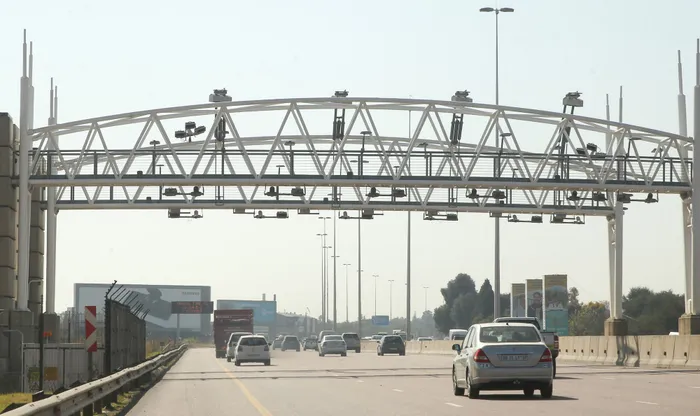
The government is borrowing more money to maintain the e-tolls while the SA National Roads Agency Limited is considering its options on the R29 billion debt it has incurred in the Gauteng Freeway Improvement Project.
Image: Jacques Naude / Independent Newspapers
Gauteng's controversial e-tolls system, abandoned over a year ago, is still milking the national fiscus of substantial amounts of public funds and could also result in motorists being held liable for the R29 billion debt incurred.
Finance Minister Enoch Godongwana has given Gauteng Finance and Economic Development MEC Lebogang Maile permission to borrow R4.1 billion to finance the maintenance and rehabilitation of phase one of the e-tolls, officially known as the Gauteng Freeway Improvement Project (GFIP).
Godongwana indicated that the purpose of the borrowing was to finance the maintenance and rehabilitation of phase one of the GFIP in line with the approved business case and fiscal framework.
According to the minister, the loan shall be repaid over a period not exceeding seven financial years, commencing in the current year (2025/26) and concluding in 2031/32.
"The total interest to be incurred in any financial year shall not exceed 1% of the province's total budgeted current revenue for that financial year. The borrowing terms are considered affordable and fiscally sustainable and will not compromise the delivery of essential public services such as education, health and social development in the province," Godongwana stated.
During the official switch-off of e-tolls in April last year, when they stopped generating income, then Transport Minister Sindisiwe Chikunga explained that since 2019, a three-member Cabinet committee tasked by President Cyril Ramaphosa had diligently explored alternative funding solutions for the GFIP debt repayment and the backlog of maintenance and rehabilitation costs.
This resulted in a memorandum of agreement that formalised solutions and outlined the financial contributions from Gauteng and the national government.
At the time, it was clearly emphasised that the user-pay principle, which underpinned the e-tolls, remained the government's policy.
The government, however, committed itself to continually engaging all stakeholders to explore adequate and sustainable funding solutions for road construction, maintenance, and upgrades, supporting economic development.
In addition, the government indicated that it was still in discussion regarding the historical debt owed by motorists.
The SA National Roads Agency Limited (Sanral) is also considering going after the motorists who owe the entity billions of rands in unpaid e-tolls debt.
According to Sanral, the entity is in the process of obtaining a legal opinion on the possible actions relating to collection of long outstanding e-toll debtors' balance.
"It is envisaged that a decision will be taken after finalising a legal opinion and fulfilling all the required governance processes, including consultation with the relevant stakeholders and the executive authority (Minister of Transport Barbara Creecy)," the agency explained.
Sanral has stated that even though the debt is not written off, the impairment reflects that the expected future losses are assessed annually at the end of each reporting period and that the probability of debt collection is based on historic trends and future economic factors that may affect the collection.
The e-tolls had a default rate of 100% and are now a non-toll asset, according to Sanral.
Sanral the experiences of the past years has seen it face increased public objections, appeals and legal process citing the affordability concerns and that due consultation processes were not followed at the inception in tolling the GFIP.
This also made it difficult for the entity to implement the statutory requirements and to institute any legal processes to collect the statutory revenue that is due for the services provided and receivables for the amounts that are still due.
loyiso.sidimba@inl.co.za